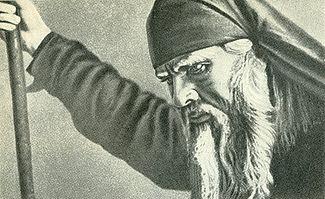
The great bass Fyodor Chaliapin as Dosifey, a role he owned in the early 20th century.
Photo from Wikimedia Commons.
When Mussorgsky decided to write an opera about the rise of Peter the Great, he was faced with one small problem: an Imperial edict forbidding the portrayal of any Romanov Tsar on the Russian stage. To solve the problem and tell the story of Peter's rise to power, the composer focused on the forces opposing Peter's rise.
Writing his own libretto and working from historical documents, Mussorgsky focused on three groups: the Streltsy riflemen, (Their commander, Ivan Khovansky lends the opera its title) various conniving boyars, and the Old Believers, the faction of fanatical Russian Orthodox churchgoers who believed that Peter was literally the Anti-Christ. The story ends on a grim note, as the Old Believers choose to burn themselves to death inside a church rather than live with Peter's religious reforms.
Mussorgsky died at the age of 42, leaving the libretto, some musical fragments, and piano sketches for the first four acts. His friend Nikolai Rimsky-Korsakov orchestrated and revised the opera, softening the ending and writing the orchestration in his own style. In the 20th century, Igor Stravinsky and Dmitri Shostakovich each took a crack at completing Khovanshchina. The Met uses the Shostakovich version, in a well-preserved August Everding staging from 1985.
Recording Recommendation:
Although it is much more obscure than Boris Godunov, Khovanshchina is well represented on CD. For the Shostakovich orchestration, Valery Gergiev's recording with the Mariinsky Theater is a safe recommendation. But it's out of print, caught in the current label transition of the Philips catalog over to Decca.
Vienna State Opera Orchestra and Chorus cond. Claudio Abbado (DG, 1989)
Ivan Khovansky: Aage Haugland
Marfa: Marjana Lipovšek
< b="">Dosifey: Paata Burchuladze
With a cosmopolitan cast (an Italian conductor, Austrian orchestra and chorus, a Danish Ivan, a Czech Marfa, and a Georgian Dosifey) this recording dates from before the collapse of the Iron Curtain. But it is notable for Mr. Abbado's tasteful conducting of the score. Based on a series of performances in Vienna, this is a powerful version of the opera. The first four acts are the Shostakovich version. The last act (the immolation of the Old Believers) uses Igor Stravinsky's orchestration, based on Russian church modes. It is quiet, moving way to end the opera.
Return to the Metropolitan Opera Season Preview!

